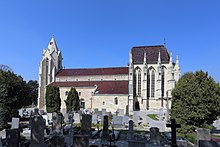Bad Deutsch-Altenburg
Bad Deutsch-Altenburg | |
|---|---|
 Museum Carnuntinum | |
| Coordinates: 48°8′N 16°54′E / 48.133°N 16.900°E | |
| Country | Austria |
| State | Lower Austria |
| District | Bruck an der Leitha |
| Government | |
| • Mayor | Hans Wallowitsch (SPÖ) |
| Area | |
• Total | 12.58 km2 (4.86 sq mi) |
| Elevation | 148 m (486 ft) |
| Population (2018-01-01)[2] | |
• Total | 1,765 |
| • Density | 140/km2 (360/sq mi) |
| Time zone | UTC+1 (CET) |
| • Summer (DST) | UTC+2 (CEST) |
| Postal code | 2405 |
| Area code | 02165 |
| Website | www.baddeutsch-altenburg.at |
Bad Deutsch-Altenburg, until 1928 Deutsch-Altenburg (Hungarian: Németóvár) is a market town and spa in the district of Bruck an der Leitha in Lower Austria in Austria.
Geography
[edit]The town lies in the Lower Austrian Industrieviertel region, on the right riverbank of the Danube River and the Danube-Auen National Park, south-west of Hainburg an der Donau and Devín Gate.
The health resort is centered on iodine and sulfur springs, which are one of the most powerful in Central Europe.
Climate
[edit]Bad Deutsch-Altenburg in the transitional zone between having an oceanic climate and a humid continental climate (Cfb bordering on Dfb according to the Köppen climate classification). On 8 August 2013, a temperature of 40.5 °C (104.9 °F) was recorded, which is the highest temperature ever recorded in Austria.[3]
History
[edit]
The settlement in the Duchy of Austria, located around a medieval castle at the site of the former Roman camp of Carnuntum, was first mentioned in 1297 and received market rights in 1579. The prefix Deutsch- was added to differ it from nearby Altenburg (Óvár) in Hungary. From 1916/17 it was the site of a large longwave and high frequency radio transmitter station, which was dismantled in the 1980s.[citation needed]
In March 1945, numerous Jewish forced labourers were deported on a death march from the south-east wall to Bad Deutsch-Altenburg, where they had to embark up the Danube to Mauthausen concentration camp. A memorial stone marks the site of a mass grave, where exhausted prisoners shot by the security forces were buried.[4]
Politics
[edit]Seats in the municipal assembly (Gemeinderat) as of 2010 elections:
- Social Democratic Party of Austria (SPÖ): 7
- Austrian People's Party (ÖVP): 5
- Team Altenburg (Independent): 5
- Wir Altenburger (Independent): 1
- Freedom Party of Austria (FPÖ): 1
Notable people
[edit]- Carl Hollitzer (1874—1942), caricaturist, singer and cabaret artist
- Blessed Anton Durcovici (1888—1951), Catholic clergyman and Bishop of Iaşi
- Hannes Swoboda (born 1946), politician
References
[edit]- ^ "Dauersiedlungsraum der Gemeinden Politischen Bezirke und Bundesländer - Gebietsstand 1.1.2018". Statistics Austria. Retrieved 10 March 2019.
- ^ "Einwohnerzahl 1.1.2018 nach Gemeinden mit Status, Gebietsstand 1.1.2018". Statistics Austria. Retrieved 9 March 2019.
- ^ "Neuer Hitze-Rekord: 40,5 °C in Bad Deutsch-Altenburg". ZAMG. 9 August 2013. Archived from the original on 10 August 2013. Retrieved 9 August 2013.
- ^ Eleonore Lappin: Die Todesmärsche ungarischer Juden durch Österreich im Frühjahr 1945. Institut für Geschichte der Juden in Österreich, 2008.


